Key takeaways:
- Deposits secure reservations and enhance preparation, ensuring quality dining experiences for both patrons and staff.
- They foster respect and commitment between diners and restaurants, contributing to tailored and memorable occasions.
- Deposit policies vary by restaurant, with common practices including fees for larger parties and special events.
- Effective communication and understanding of deposit terms can lead to better dining experiences and potential savings.
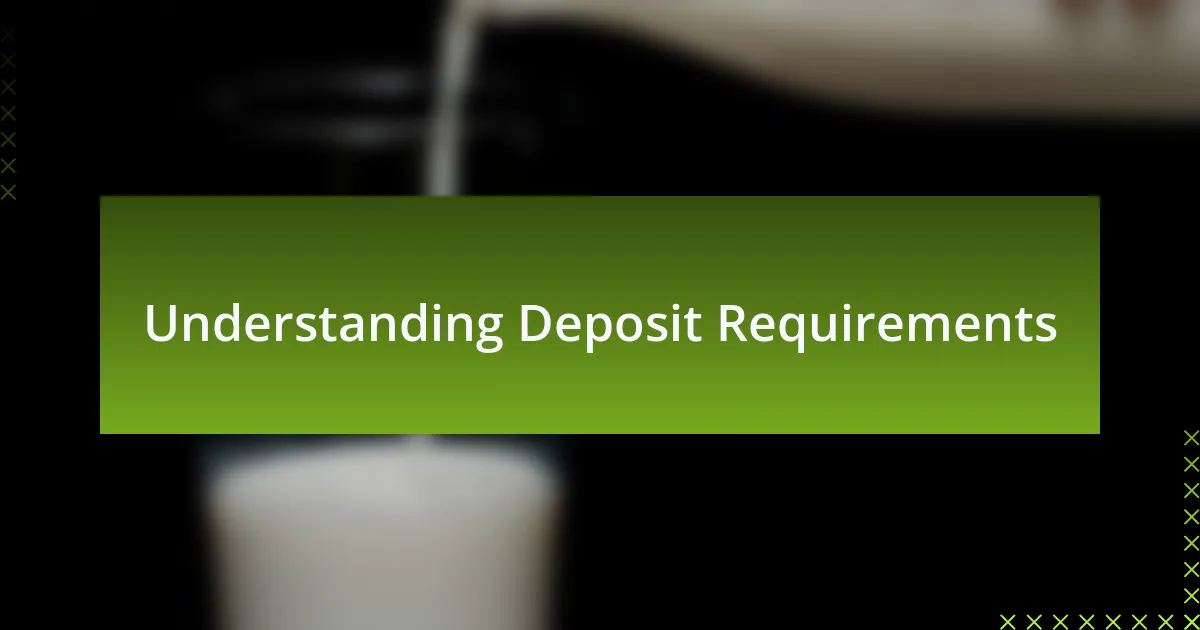
Understanding Deposit Requirements
Deposit requirements in fine dining restaurants can often seem daunting, but they play a crucial role in securing your reservation. I remember once planning a special dinner for my anniversary; the restaurant required a deposit to confirm our table. At first, I hesitated, but I soon realized it ensured a lovely experience without any last-minute cancellations.
Understanding why restaurants implement these deposits can also enhance your diner’s perspective. It’s not just about holding a table; it aims to ensure that the culinary staff can prepare adequately for a full house. Have you ever walked into a restaurant only to find it overcrowded or underprepared? I certainly have, and it’s a frustrating experience that can be mitigated with proper planning through deposits.
Moreover, these deposits often reflect the restaurant’s commitment to maintaining exclusivity and high service standards. For instance, in my experience, I’ve noticed that places that ask for these fees are usually more attentive to their customers. Isn’t it reassuring to know your reservation is taken seriously? It offers peace of mind, allowing you to focus on enjoying your meal.
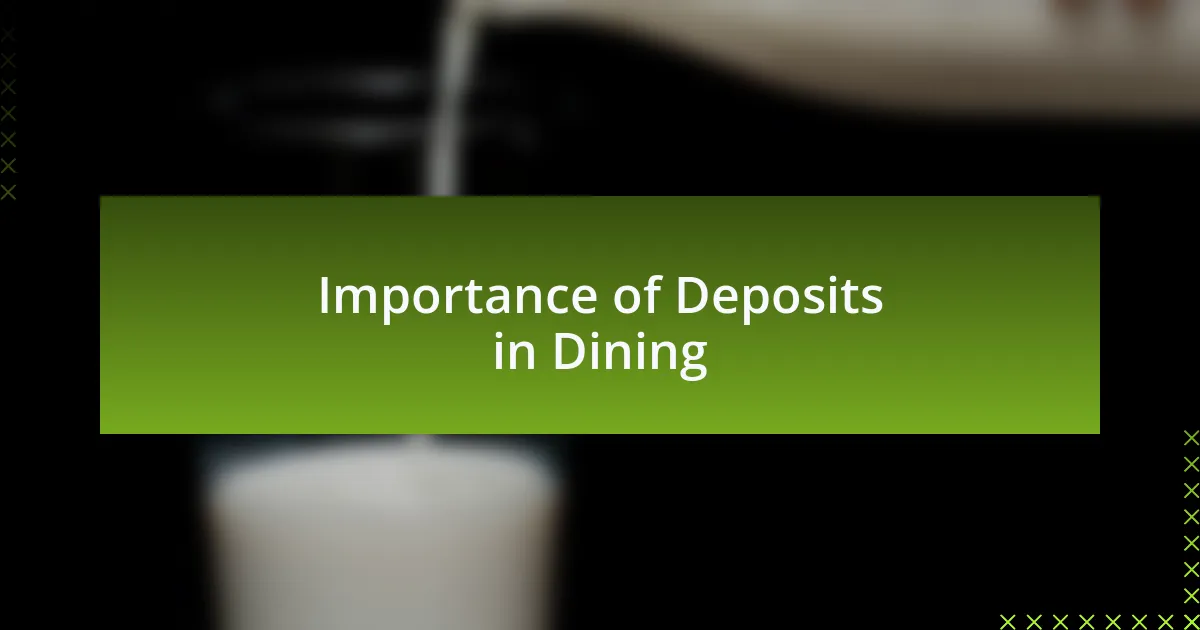
Importance of Deposits in Dining
When I think about the importance of deposits in fine dining, it’s clear that they help manage expectations on both sides. For example, when I made a reservation at a well-known restaurant for my birthday, I gladly paid the deposit. It eased my worries that I might not get a table or encounter an uncomfortable wait. With that financial commitment, I felt a sense of assurance that my significant evening was secured.
Deposits also foster a level of respect between diners and restaurant staff. I recall dining at a place that required a deposit for larger parties, and it made me realize how this policy helped them prepare for our arrival. The staff was already aware of our group size and had ample time to plan an exceptional experience. Isn’t it wonderful when the people behind the scenes can create a tailored dining experience just for you?
Moreover, I believe deposits create a stronger bond between the dining experience and the value of the meal. When I pay a deposit, I mentally shift into a more appreciative mode, eager to savor each dish. This investment turns the meal from just another outing into a memorable occasion, as I know the restaurant has thoughtfully prepared for my visit. Don’t you find that when you invest in an experience, you tend to treasure it even more?
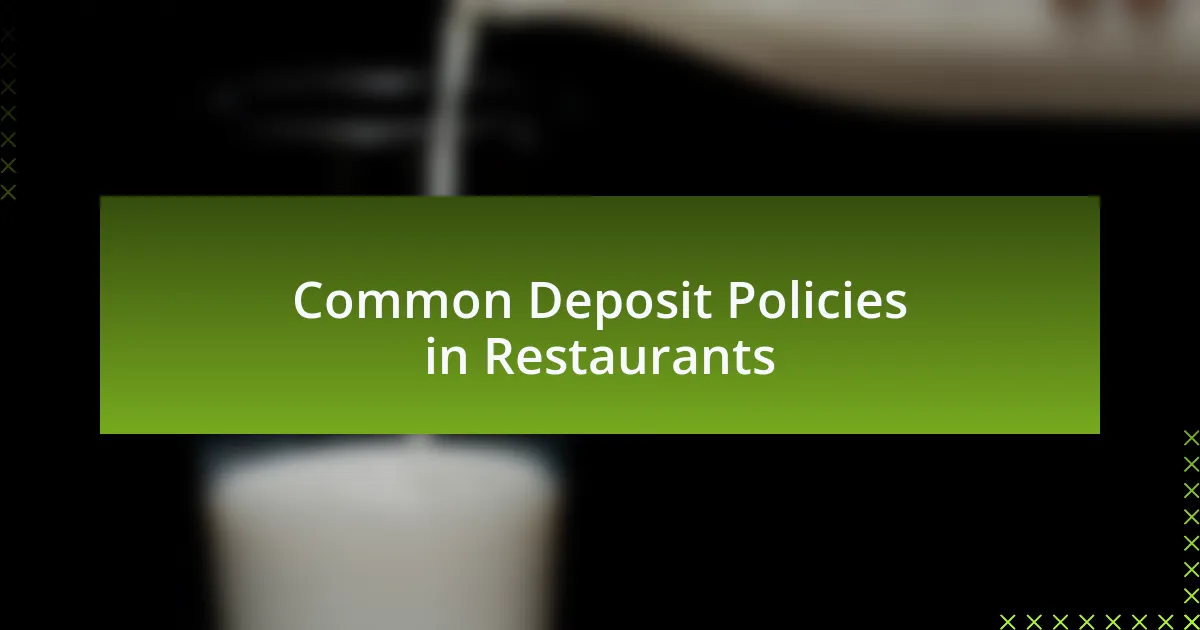
Common Deposit Policies in Restaurants
Deposit policies can vary significantly among restaurants, but some common practices stand out. For instance, I’ve encountered a few upscale dining establishments that require a deposit when booking for larger parties. This not only ensures that the restaurant can properly prepare for a bigger group but also alleviates the stress that comes with no-shows. I remember once organizing an intimate dinner for eight, and when I paid the deposit, I felt a sense of commitment from all my guests to show up and enjoy the evening together.
Another frequent policy I’ve seen is charging a deposit for special occasions, like holiday meals or chef’s tables. When I celebrated a significant anniversary at a high-end venue, the restaurant asked for a deposit to hold our reservation. This approach made me feel special, knowing they were investing time and resources specifically for our celebration. It’s moments like these that highlight the importance of proper planning in delivering a true fine dining experience.
Some places implement a sliding scale for their deposit amounts based on the party size or the day of the week. I find this method especially interesting because it reflects the restaurant’s understanding of demand fluctuations. For example, a mid-week dining experience with a lower deposit seemed more approachable, making me more inclined to make that reservation. Have you ever booked a table only to feel relieved when the deposit was less than you anticipated? It makes the prospect of a night out even more enticing!
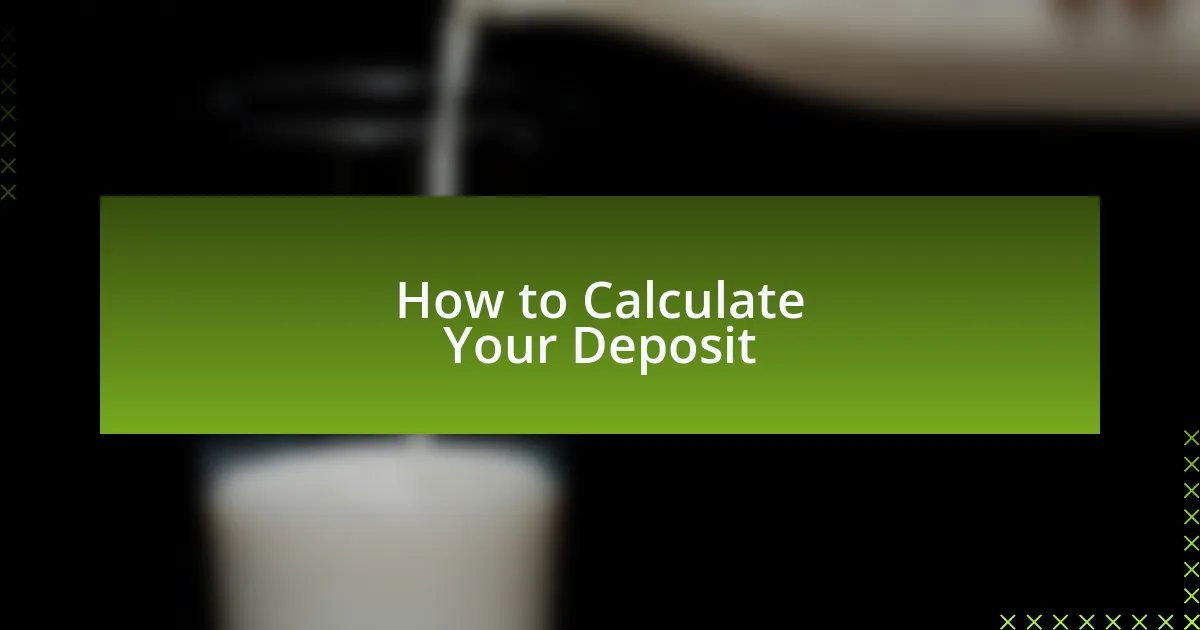
How to Calculate Your Deposit
To calculate your deposit, consider the restaurant’s policy regarding party size and reservation type. I’ve often seen a straightforward formula where the deposit equals a percentage of the total estimated bill. For instance, if you’re planning a dinner that’s expected to cost $400, a 20% deposit would require you to pay $80. This method helps ensure that your reservation is secure while keeping the financial commitment reasonable.
Another aspect to factor in is the timing of your reservation. Some restaurants adjust their deposit requirements based on the day or time of your booking. I remember one weekend when I wanted to treat friends to a fancy dinner. The restaurant had a higher deposit rate for Saturday nights, which prompted me to reconsider and opt for a Friday instead. What a revelation that was! Not only did I save money, but it also made the decision to dine out feel a bit more relaxed.
Finally, it’s essential to confirm the details with the restaurant directly. Each place often has unique calculations based on their business model. When I once verified deposit specifics for a special tasting menu, I discovered that they offered a reduced amount for early bookings. I was pleasantly surprised to learn that a simple conversation could lead to savings! Have you checked in on these nuances before? Trust me, a little inquiry can often lead to a more enjoyable dining experience.
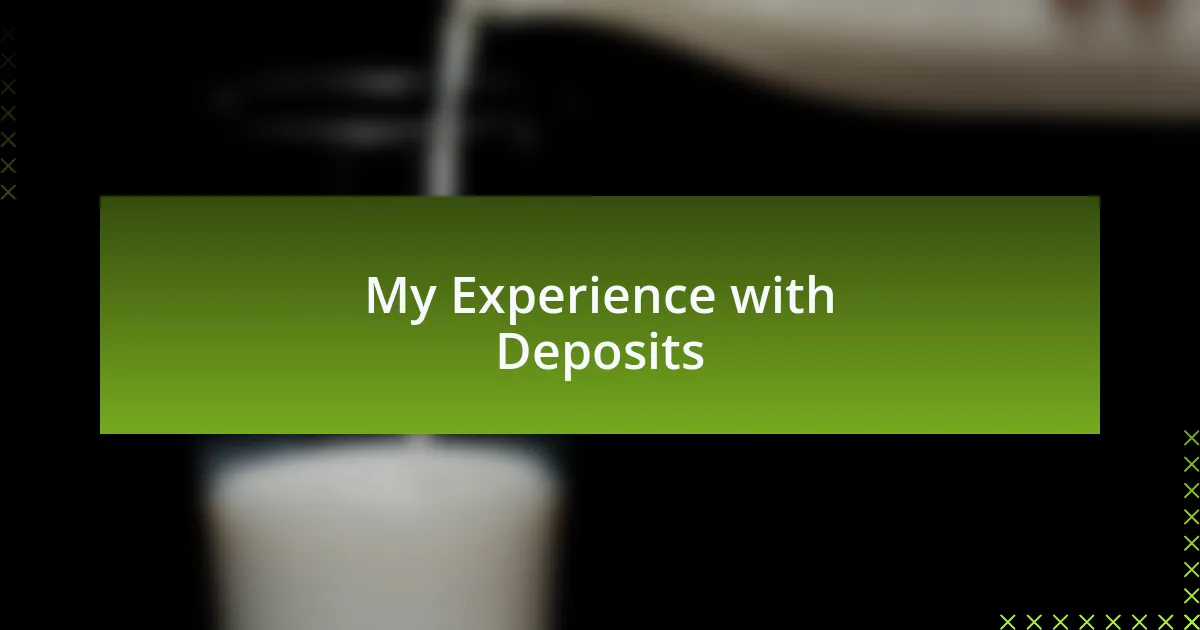
My Experience with Deposits
When I first encountered deposit requirements at fine dining restaurants, it felt a bit bewildering. I can recall one instance when I was organizing a special celebration. The restaurant requested a deposit to secure our reservation, which initially made me anxious. However, after reflecting on it, I realized that this practice is simply a way to ensure that the restaurant can manage their reservations effectively while also guaranteeing my spot for that eagerly anticipated dinner.
There was another time when I had to decide whether to pay a substantial deposit for a private chef’s table experience. I hesitated, thinking about all the other expenses piling up. But I took the plunge, and it turned out to be one of the most rewarding dining experiences I’ve ever had. That deposit was my commitment to a night filled with exquisite food and memorable moments. Did I regret it? Absolutely not! That meal was worth every penny, and the deposit felt like a small price to pay for such an extraordinary evening.
I often wonder how many people view deposits as a barrier rather than a gateway to unforgettable experiences. In my case, the expectation of paying a deposit transformed my dining journey. It made me more mindful and appreciative of the occasion. After all, securing a table at a celebrated restaurant often means investing in more than just a meal; it’s about creating lasting memories. Have you ever thought about how a simple deposit could elevate your restaurant experience?
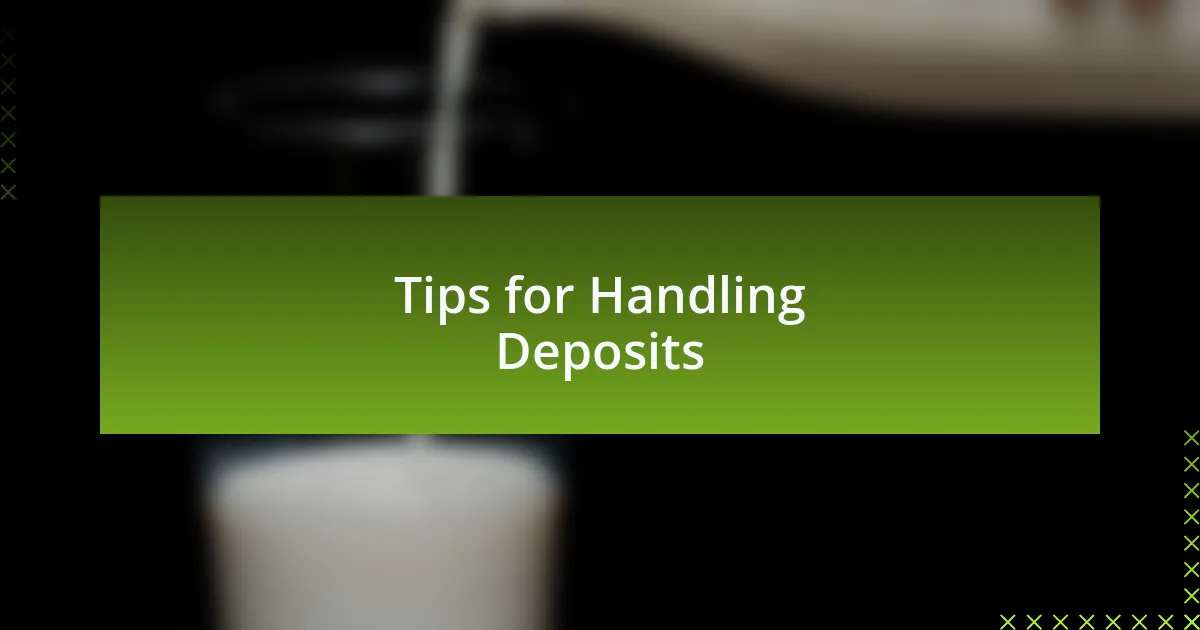
Tips for Handling Deposits
When handling deposits, I’ve found it helpful to be transparent with the restaurant about my plans. On one occasion, I communicated my excitement for a special dinner while discussing the deposit. The manager appreciated my enthusiasm and even offered some personalized recommendations for the menu, which made the experience even more enjoyable. Isn’t it interesting how a simple conversation can enhance your dining experience?
Planning ahead is another tip that has served me well. For instance, I once faced a last-minute change in schedule after paying a deposit for a wine-pairing dinner. By reaching out promptly to discuss my options, the restaurant was able to accommodate a reschedule rather than forfeiting my deposit. These proactive conversations can save you time and money. Have you ever thought about how being prepared might reduce stress and lead to a smoother dining experience?
Lastly, I always read the deposit policy thoroughly before committing. I remember booking a tasting menu that had a steep deposit, and as I double-checked the terms, I discovered a cancellation policy that offered flexibility. This insight not only eased my mind but also allowed me to enjoy the anticipation without worry. What does knowing the details of a deposit policy mean to you? For me, it translates to confidence and peace of mind in my fine dining adventures.
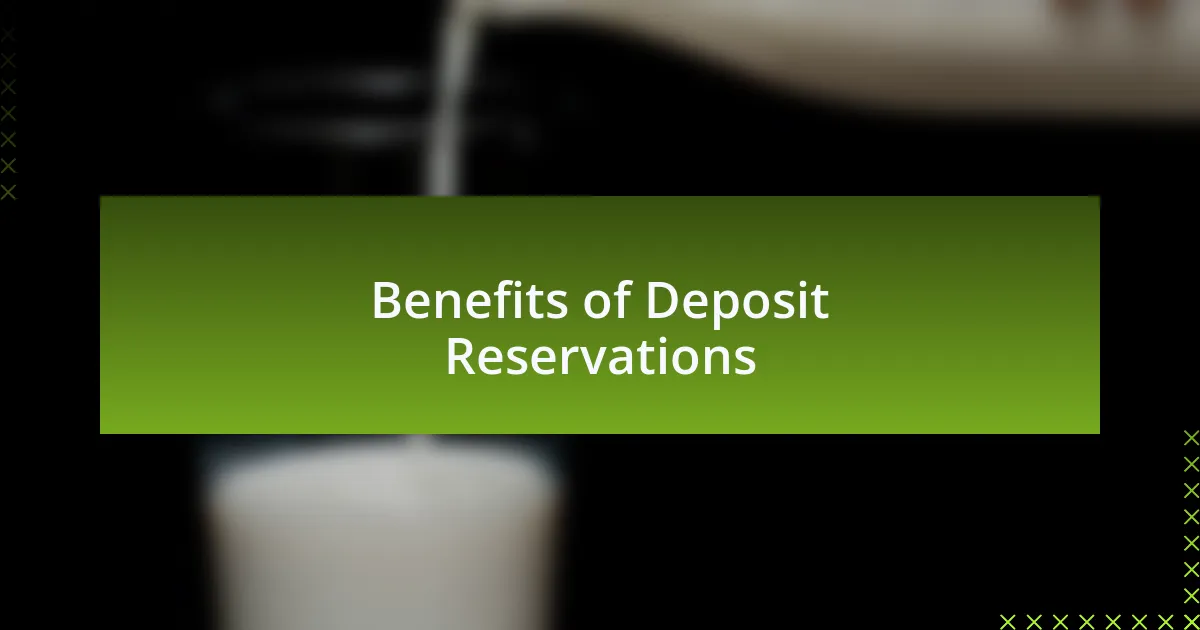
Benefits of Deposit Reservations
Making a deposit reservation often signifies a commitment to a special dining experience. I remember the thrill I felt securing a table for an anniversary dinner. The act of placing a deposit wasn’t just about reserving a spot; it was a tangible representation of my intention to celebrate, and that anticipation added to the excitement of the evening.
Deposits can also enhance the overall experience by providing a sense of exclusivity. For example, I once reserved a private dining room at a renowned restaurant with a deposit. That initiative not only secured my place but also offered a personalized menu to elevate the occasion, making the meal unforgettable. Have you noticed how that exclusivity can make you feel like a VIP for the night?
In my experience, deposit reservations can streamline the planning process. When I paid a deposit for a major birthday celebration, the restaurant became more involved in the planning, ensuring everything from the table décor to the menu was tailored just for us. It really struck me how a financial commitment can foster a collaborative relationship between diners and restaurateurs, resulting in a truly memorable occasion. Isn’t it remarkable how a simple deposit can pave the way for such a richer dining experience?